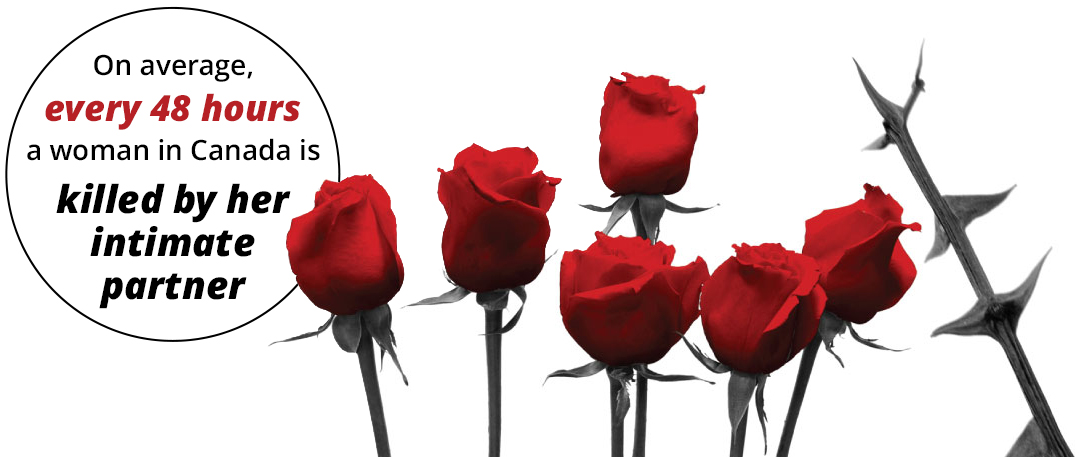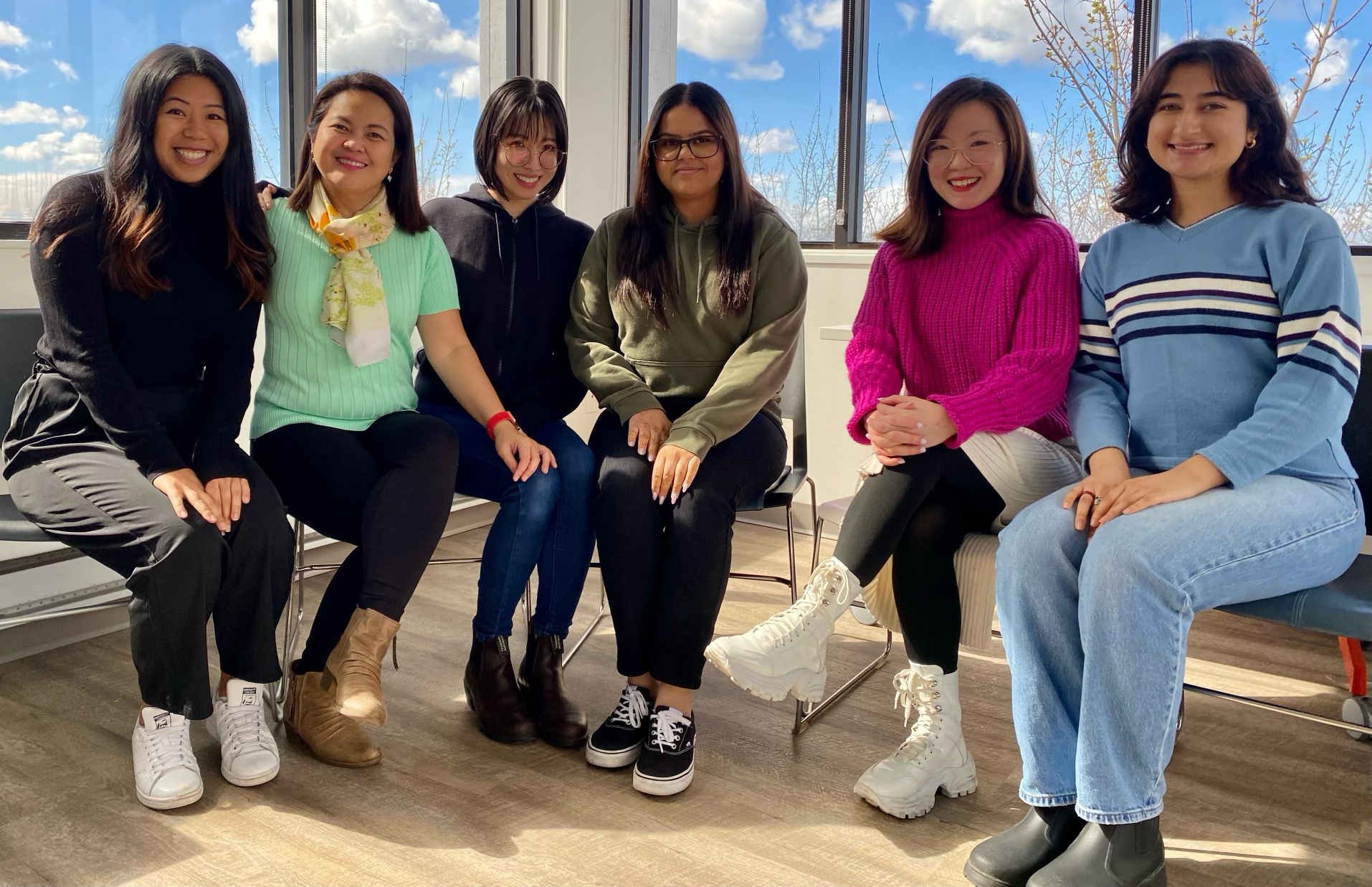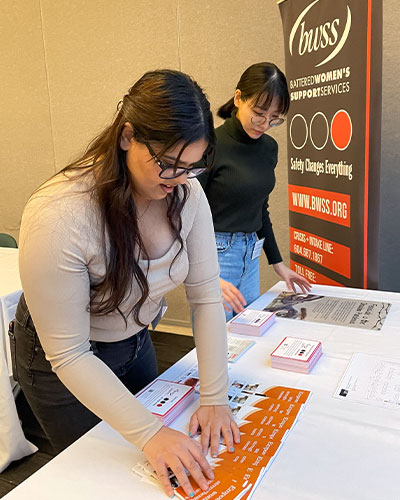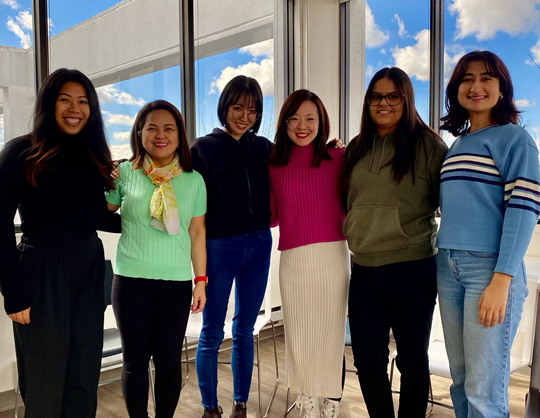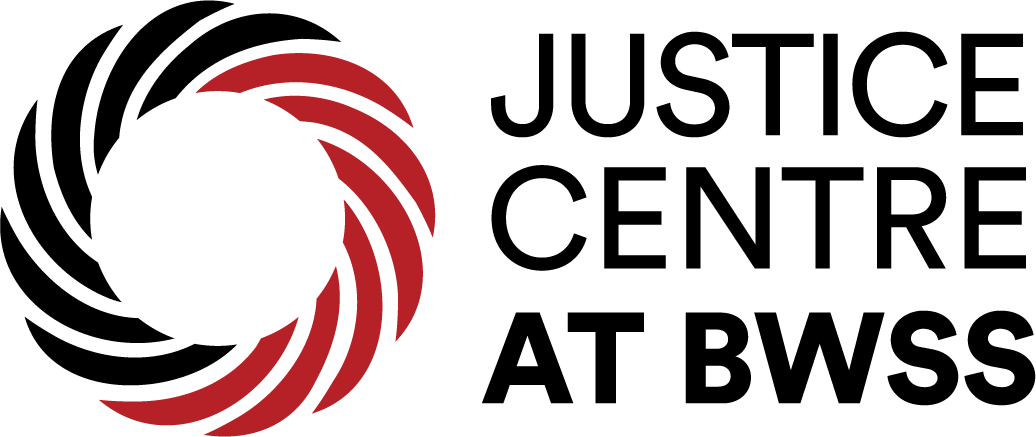
The Justice Centre at BWSS provides enhanced legal supports and education that play a critical role in helping survivors navigate complex legal systems and bridging a gap in services that is often insurmountable without support.
Founded in 1979, Battered Women’s Support Services (BWSS) takes action to end violence against women and girls through community-based interventions, support services, legal and systemic advocacy, education and training, violence prevention and research and policy.
For nearly 45 years, BWSS has provided a community based legal advocacy program in Metro Vancouver providing legal supports for women and femmes who have experienced intimate partner, domestic and sexualized violence helping survivors navigate the Canadian legal system.
Our supervised staff, interns and volunteer lawyers provide legal information, accompaniment to court and legal appointments, we appeal when legal aid has been denied and we aid with documents and affidavits preparation.
Sally, Karen, Hanna, Nav, Tina and Mariam
The Justice Centre at BWSS is a community- based legal clinic, providing trauma and violence informed, multilingual, and culturally responsive legal services to diverse women who have experienced violence in BC.
It is a centre for survivors, created in response to the urgent need to address systemic barriers that prevent women from accessing legal services and obtaining fair and just outcomes. It has been carefully designed to address the increasing needs of the community and will serve as a powerful tool in empowering survivors of violence and promoting justice for women survivors.
The Justice Centre at BWSS is more than access to justice—the presence of a legal advocate can help toward the opportunity to access a just result for survivors who are facing family law, immigration, child welfare, and/or criminal legal systems.
For nearly 45 years, through the supports given by the program, women survivors of violence in British Columbia (B.C.) have been able to leave their abusive relationship, receive more fair custody and access orders that increase the safety for their children, have been able to have a voice in mediation proceedings, and very importantly have access to legal representation in their legal cases.
To make an appointment with the Justice Centre please call our Crisis and Intake line 1-855-687-1868 or in Metro Vancouver 604-687-1867.
Some of the legal services the Justice Centre at BWSS provides:
Legal Advice and Representation
We will take on full representation files based on: the current caseload, availability of time, the number of volunteer lawyers at BWSS, and the complexity of legal issues involved.
BWSS will also consider if the following applies:
- The woman has been denied legal representation by Legal Services Society;
- The woman has appealed the Legal Services Society’s decision of denial and the appeal was unsuccessful;
- There are multiple barriers that prevent the woman from self-representation, including language, disability, complexity of legal issues, gender orientation, and impact of trauma;
- The use of the court system by the abuser as way to intimidate or harass or to continue any form of violence;
- The inability to privately retain a lawyer, such as financial difficulties; and
- The legal issue is either a family law, child protection or immigration law matter.
Family Law Clinic
BWSS provides summary legal advice clinics in family law with volunteer lawyers from the community.
These clinics are able to offer necessary summary legal advice to women on a continuous basis while they are unrepresented in the family law system.
The National Inquiry into Missing and Murdered Indigenous Women and Girls
BWSS has been standing in solidarity with Indigenous women across Turtle Island in calling for a National Inquiry into missing and murdered Indigenous women and girls in Canada since before British Columbia’s Missing Women’s Commission of Inquiry (MWCI). On top of running a crisis line and offering legal, advocacy and counselling services, we are actively involved in a coalition on Missing and Murdered Indigenous Women and Girls formulated out of the failure of both group and family participation in the MWCI. Our efforts working in western Canada and northwest British Columbia through an initiative called Women’s Leadership and Training brought together Indigenous women to organize local responses to violence toward. We are an active long-time member of the February 14th Women’s Memorial March committee to honour Indigenous women who have lost their lives to violence in downtown eastside Vancouver.
In August 2017, BWSS was successful in obtaining Standing to make submission in the National Inquiry into Missing and Murdered Indigenous Women and Girls. A team of dedicated and passionate women from BWSS, led by the Indigenous Women’s Program, in collaboration with the Legal Services and Advocacy Program, are currently in the process of drafting the written submissions in order to give a voice to the countless Indigenous women and girls who have accessed our services and continue to be invisible in the justice system.
Legal Advocacy Workshops
For women who have or are experiencing violence in their relationships and require legal support with the resulting family law issues. Lawyers from the community with experience in family law will facilitate all workshops.
Court and Immigration Forms
In partnership with the Amici Curiae Paralegal Program, BWSS provides assistance to unrepresented women with drafting Supreme Court forms in family law proceedings, including affidavits, desk order divorce applications, and financial statements.
Immigration forms by appointment for:
- Permanent Residency Application under Refugee for women who have been abused or escaped from family violence;
- Temporary Resident Permit (TRP) for family violence Application Forms with an Open Work Permit Forms.
*Upcoming* MCFD Advocacy Clinics
BWSS is proud to be one of the first organizations in the province of BC to provide advocacy workshops to women who have involvement with the Ministry of Child and Family Development.
The Indigenous Women’s Program, in collaboration with the Legal Services and Advocacy Program, will be providing monthly clinics to women who have an open file with the MCFD. Staff and volunteers will provide women with short-term support, legal advocacy, court and MCFD meeting accompaniments, and strategic advocacy to support women in keeping themselves and their children safe. Watch this space for updates on the dates of these clinics!
Objectives of the Justice Centre at BWSS
To ensure that the issue of violence against women is taken into consideration throughout the entire legal process;
To work towards ensuring that the legal system is accountable to women, by advocating with police, lawyers and others who work within the legal system;
To improve legal responses to women who have experienced abuse in intimate relationships;
To lobby for the right of women to have accessible legal representation throughout their legal proceedings;
To lobby for the right of women to have adequate and secure social assistance.
In 2021 the Justice Centre at BWSS supported:
Survivors accessed services
Family law issues
Indigenous survivors
Racialized survivors served in a language other than English
Child protection issues
Other matters, including Immigration/Refugee and Criminal
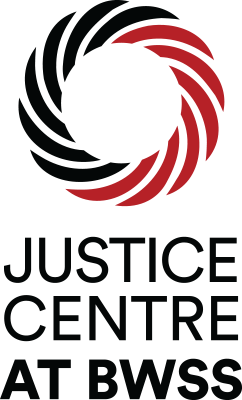
Approximately 80% of the women who access the legal services at BWSS do not have legal representation because they are not eligible to receive government funded legal aid and do not have the money to privately retain their own lawyers.
The Justice Centre fills a critical gap in services for women who face systemic barriers in accessing legal support and achieving justice on their own.
It provides a safe and supportive space for women to receive the legal guidance and representation they need and deserve as a basic constitutional right which is often denied due to systemic barriers created by the Canadian government and legal system and reinforced by patriarchal values of the legal system itself that prevent survivors from having equitable access to the legal system.
Some systemic barriers to justice include:
Navigating the Canadian legal system while systemic, institutional, and governmental responses to intimate violence tend to default to ‘race-neutral’ frameworks;
Lack of access to culturally safe services; mistrust of the legal system and other state systems; and being minimized or disbelieved;
Astronomically high legal fees and reduction in government funded legal aid hinder access to fair legal representation;
Women are forced into mediation services when the power and violence issues make them susceptible to more abuse;
Language, disability, complexity of legal issues, gender orientation, and impact of trauma;
Women must share custody with violent, unpredictable ex-spouses who know where they live;
Working women are losing income in order to access support services;
Survivors do not receive fair or just child/spousal support payments to adequately provide for their children;
Women must research and use self-help resources for complex legal problems that should be handled by a lawyer, and women who do have Legal Aid report that they deal with lawyers who do not take violence seriously and leave it out of the proceedings when it is integral to fair legal outcomes for battered women.
Legal Aid has been significantly reduced to a mere 28 hours. The cuts to Legal Aid are violating women’s constitutional rights to be considered equal before and under the law. Note: While the violation is not blatantly stated in any legislation, in practice, women are disadvantaged by Legal Aid in B.C. by their policies of eliminating poverty and most family law representation. These areas of law are mostly women specific.
Support the Justice Centre at BWSS
Over 80% of women accessing Battered Women’s Support Services identify at least one legal issue where they require information. 94,736 (and growing) is the alarming number of times someone experiencing domestic or sexualized violence has reached out to BWSS between March 1, 2020 and March 31, 2022.
The urgent need for Justice
The majority of the women who access services navigate a complex intersection of legal systems and a high percentage of women do not have adequate legal representation.
The JC takes an intersectional approach to accessing justice while aiming to advance systemic advocacy by changing the legal systems that oppress women on their path to finding safety.
Overall, survivors of violence often face significant legal and systemic challenges, such as abusers who exploit their knowledge of the legal system or the patriarchal nature of the legal system itself.
Violence escalates when a woman decides to separate from her abusive partner. After separation, an abusive partner will try to maintain his power and control through many ways, including through court-related abuse and harassment.
In many cases, abusive partners use the court process to harass, degrade and force women to concede to their demands.
Often women are navigating several areas of the law concurrently and often at opposing purposes.
Some survivors face heightened barriers to justice, as they are often being criminalized for reporting violence, having their children apprehended, or facing deportation.
This is further magnified for those who are low-income, single parents, and/or working in criminalized or under-the-table economies such as sex work or garment factories.
Women who do have Legal Aid report that they deal with lawyers who do not take violence seriously and leave it out of the proceedings when it is integral to fair legal outcomes for battered women.
There is a lack of proper training for justice system participants to effectively respond to women who are survivors of family violence.
Even with Legal Aid support, representation is most often inadequately funded with representation that left the survivor feeling unheard and disrespected, particularly in regards to the effect of violence on them and their families.
The legal system can be alienating, intimidating, and re-traumatizing to women survivors of violence seeking justice. This is especially true for Indigenous survivors of violence, who face a legal system that was created to protect and advance colonial interests.
The Justice Centre at BWSS will continue to advocate for law reform, gender, and racial justice to drive systems change advancing gender and racial justice for women survivors of violence in B.C., Canada and internationally.
Sally, Karen, Hanna, Tina, Nav, and Mariam
We’re here to support you in navigating complex legal systems.
You can get access legal resources online here or call the BWSS Crisis and Intake Line at 1-855-687-1868
